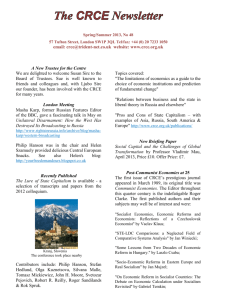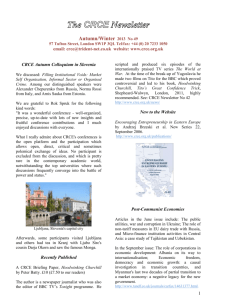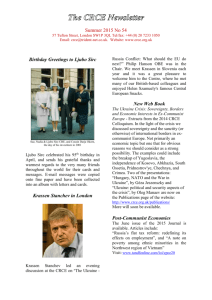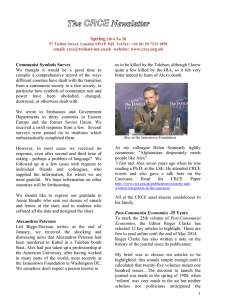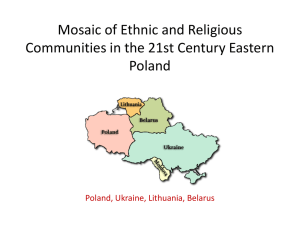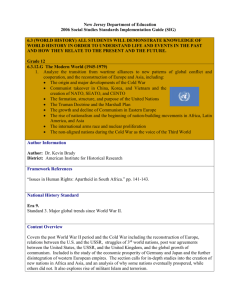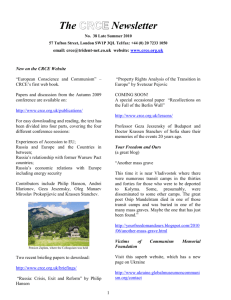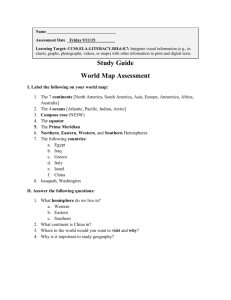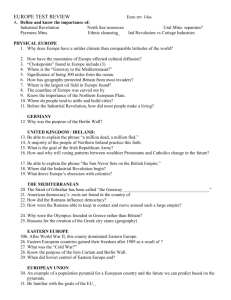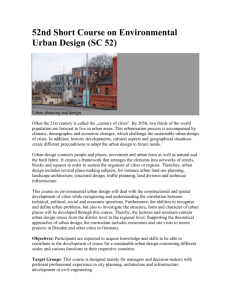Word format - CRCE - Centre for Research into Post
advertisement
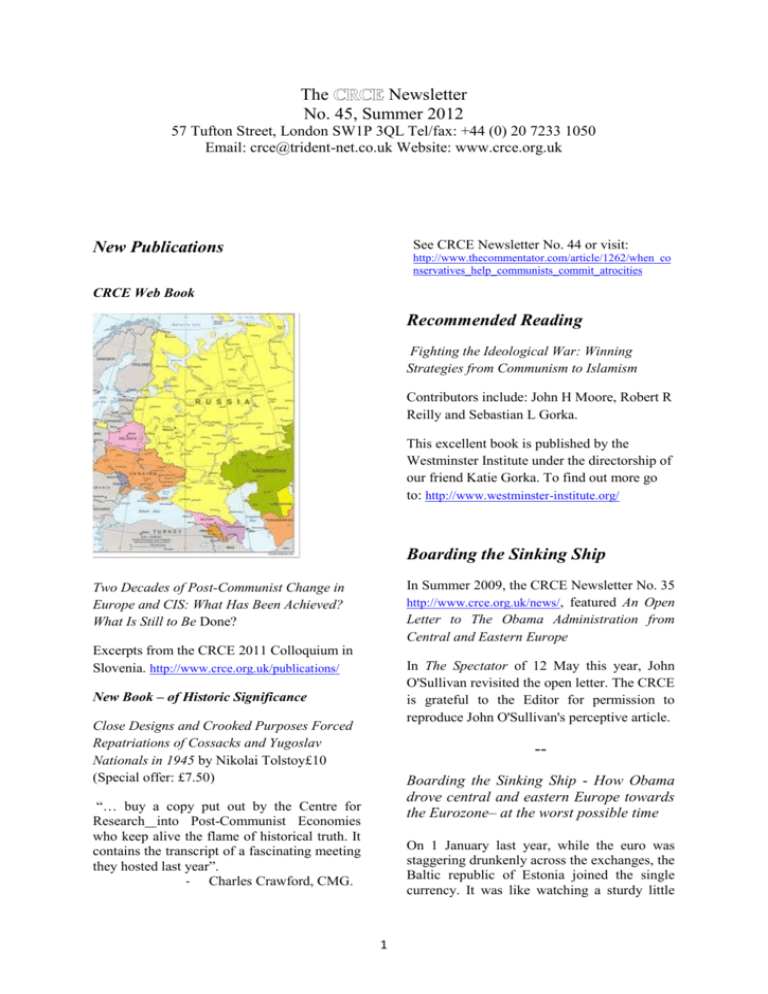
The Newsletter No. 45, Summer 2012 57 Tufton Street, London SW1P 3QL Tel/fax: +44 (0) 20 7233 1050 Email: crce@trident-net.co.uk Website: www.crce.org.uk See CRCE Newsletter No. 44 or visit: New Publications http://www.thecommentator.com/article/1262/when_co nservatives_help_communists_commit_atrocities CRCE Web Book Recommended Reading Fighting the Ideological War: Winning Strategies from Communism to Islamism Contributors include: John H Moore, Robert R Reilly and Sebastian L Gorka. This excellent book is published by the Westminster Institute under the directorship of our friend Katie Gorka. To find out more go to: http://www.westminster-institute.org/ Boarding the Sinking Ship In Summer 2009, the CRCE Newsletter No. 35 http://www.crce.org.uk/news/, featured An Open Letter to The Obama Administration from Central and Eastern Europe Two Decades of Post-Communist Change in Europe and CIS: What Has Been Achieved? What Is Still to Be Done? Excerpts from the CRCE 2011 Colloquium in Slovenia. http://www.crce.org.uk/publications/ In The Spectator of 12 May this year, John O'Sullivan revisited the open letter. The CRCE is grateful to the Editor for permission to reproduce John O'Sullivan's perceptive article. New Book – of Historic Significance Close Designs and Crooked Purposes Forced Repatriations of Cossacks and Yugoslav Nationals in 1945 by Nikolai Tolstoy£10 (Special offer: £7.50) -Boarding the Sinking Ship - How Obama drove central and eastern Europe towards the Eurozone– at the worst possible time “… buy a copy put out by the Centre for Research into Post-Communist Economies who keep alive the flame of historical truth. It contains the transcript of a fascinating meeting they hosted last year”. - Charles Crawford, CMG. On 1 January last year, while the euro was staggering drunkenly across the exchanges, the Baltic republic of Estonia joined the single currency. It was like watching a sturdy little 1 lifeboat ferrying new passengers determinedly towards the Titanic after the ship had struck the iceberg. What could they possibly mean by it? accession vote in persuading first the public, then the other main parties, that the EU should be an intergovernmental body rather than a supranational one. ‘For Estonia, the choice is to be inside the club, among the decision makers, or stay outside of the club,’ the Estonian prime minister told reporters. ‘We prefer to act as club members.’ Not just any old EU or euro club either, but the inner sanctum of solvent, growing, and prosperous creditor members of the euro such as Germany and Finland. There is some Eurosceptic opinion in every ‘New Europe’ country. After listening to a long list of organisations that supported EU accession, I asked a Hungarian politician: ‘Who then opposes it?’ He replied: ‘The nation.’ Only Klaus, however, has laid the groundwork for subjecting Europe’s demands to a rational analysis of costs and benefits, including the cost in lost sovereignty, before signing on to them. Elsewhere the inchoate resistance of popular opinion to intrusions from Brussels counts for little against the unexamined Euro-commitment of the political class. In November of last year Radoslaw Sikorski, an Oxford-educated Atlanticist, went to Berlin to deliver this appeal: ‘I will probably be the first Polish foreign minister in history to say this, but here it is: I fear German power less than I am beginning to fear its inactivity. You have become Europe’s indispensable nation.’ Where does that seemingly rooted commitment come from? If we believe the clichés of 1989-91, the people of these regions wanted to become ‘normal’ countries, to ‘join Europe’ and to participate in an almost mystical European civilisation. Those explanations are not quite false. Both intellectuals and ordinary people did want to escape from life as a perpetual lying ideological crusade and to be allowed to cultivate their gardens. But they had illusions about the West, which turned out to be more anomic, unfriendly, and unwelcoming than they expected. The pure joy of freedom soon wore off. And the sacrifices required by a decade or more of painful shock therapy undermined the simple optimistic reasons for remaining committed to ‘Europe’ or, as people in New Europe significantly translate it, to ‘Euro-Atlantic structures’. He was speaking about solving the eurozone crisis, which he said was a far greater threat to Poland’s security than the Russian president’s recent threat to station missiles on the Polish border. All the same, I suppose the latter was worth at least a passing mention. Last October a Slovakian government that had rejected one of the periodical bailout fund requests from Brussels fell the following day and was replaced by a government that promptly endorsed it. That was the second time in recent years that a (rather good) Slovak government had fallen in response to pressure from Brussels. Its argument that a poor country like Slovakia that had made painful sacrifices in order to join the euro should not be required to subsidise the profligate Greeks was sympathetically ignored. What kept alive the determination to remain ‘European’ was history. And in the New Europe history is geography. Since the breakup of the Habsburg Empire after the First World War, these countries — placed as they are between the behemoths of Germany and Russia — have been desperately looking for a reliable protector. Not all the countries of central and eastern Europe — what Donald Rumsfeld called ‘New Europe’ — hop to the tune from Brussels on all occasions. Czech President Vaclav Klaus has resisted a number of Euro-initiatives, sometimes against the wish of his own legislature. At present, both branches of government stand with the Brits in refusing to endorse Europe’s second fiscal stability pact (motto: this time we probably mean it). But this kind of stance reflects Klaus’s success during the run-up to the Czech Republic’s In the 1920s they sought protection from France in the ‘Little Entente’. If that illusion had not died before, it died at Munich: France was plainly incapable of providing protection 2 even if it wished to do so which, as events revealed, it didn’t really. totalitarianism’. All lived through a nightmare lasting half a century. After Hitler’s seizure of the rump of Czechoslovakia, Britain offered the Polish guarantees and — more honourably — declared war to protect Poland. Six years later, ‘Chips’ Channon, the Tory MP who was both a frightful snob and a brilliant diarist, was attending a society wedding shortly after the Allied victory. He gestured towards the glamorous throng and said: ‘This is what we have been fighting for.’ When they emerged from it in 1989, therefore, central and east Europeans had many illusions, but the illusion that history had ended was a luxury they couldn’t afford. Even as disconsolate Russian soldiers sold their uniforms and hitchhiked eastwards, the countries of New Europe were determined to obtain an ally that could genuinely protect them. But which ally? And if the answer was ‘Euro-Atlantic structures’, which structure? ‘Really?’ responded Emerald Cunard. ‘Are they all Poles?’ For the first post-communist decade, it was no contest. New Europe wanted to enter both Nato and the European Union, but its governments left no doubt that Nato membership was their priority, because it meant American protection. That affection was reciprocated. Though the EU has rewritten history to claim credit for converting the New Europe to market democracy, it was Nato that took the lead in offering membership in return for reforms. The EU dragged its feet on expansion for the better part of a decade. And Washington had to overcome strong west European resistance to the two rounds of Nato enlargement. Our ally Poland was one of only four countries to be in the Second World War from start to finish — the others were Britain, Germany, and the Soviet Union, which, however, was on the German side for the first two years and on our side for the second three. No country suffered worse from the German occupation than Poland or resisted it more gallantly. Yet in 1945 the Western allies — for practical purposes, Britain and the US — abandoned Poland to a second occupation, this time by the Soviet perpetrators of the Katyn massacre in which 20,000 Polish officers had been murdered. Maybe we could have taken no other action. It was a betrayal all the same — and one, as the Chips Channon story illustrates, that we failed to acknowledge even to ourselves. The dates tell the story: the first Nato expansion was in 1999, the second in 2004; the EU’s first expansion was in 2004, the second in 2009. The result was that, in 2003, when the US needed diplomatic support over Iraq, it got it from nine Nato countries in Donald Rumsfeld’s New Europe. And though that declaration generated controversy, it represented a stable alliance between the New Europe and the US, in which security was exchanged for diplomatic support. Poland had the most searing experience of countries in central and eastern Europe, but it was a difference in degree rather than kind. Ukraine, the Baltic republics, the then Czechoslovakia, Hungary, Romania, Bulgaria were all trampled over by the Wehrmacht and the Red Army at different stages of the war. Some countries, Hungary for instance, took advantage of events to regain lost territory for a brief period. But all were essentially victims of their geography. None had any real independent freedom of action. All were conquered, occupied, and exploited ruthlessly. All experienced show trials, concentration camps, mass murders, and in later times the slow grinding repression of ‘soft All that changed quite rapidly with the arrival of the Obama administration. In line with his general assumption that any policy failures must flow from his predecessor’s flawed strategy, President Obama adopted the famous ‘restart button’ approach to relations with Russia. That led logically — false assumption leading to mistaken policy — to the surprise decision to cancel the original anti-missile deployment in Poland and the Czech Republic. 3 And that decision was handled so badly that the two governments felt they had been treated contemptuously as well as undermined politically. commercial pacifism, publicly appealed to Obama to more or less ignore the letter. And, more or less, that is what the President did. Accordingly, central and eastern Europe now feels it cannot rely with confidence on its American protector. It needs some other protector. You might suppose that relations between the US and the New Europe could hardly get worse after that; unfortunately you would be wrong. When Russia embarked on its small war in Georgia, it intensified all the anxieties that eastern Europeans feel about their powerful neighbour. In 2009, therefore, 17 distinguished intellectuals and former policymakers from central and eastern Europe — including Lech Walesa and the late Vaclav Havel — sent an unprecedented open letter to President Obama expressing the fear that his administration had lost interest in their region at a time when its stability and prosperity were threatened both by the financial crisis and by Russia’s apparent contempt for international law. Hence the determination of most New Europe countries to insert themselves as far as possible into the heart of the European Union and into firm alliances with its major powers and institutional authorities. This has seemed all the more necessary because, as Sikorski’s Berlin speech argued, the threat to the prosperity of central and eastern Europe from the financial and euro crises is more immediate than any security threat from Russia. Unfortunately for poor central Europe, however, this decision is clearly the second best option strategically and economically — and if the euro crisis continues to spiral downwards, maybe not even that. The former German chancellor Gerhard Schroeder, expressing a bipartisan policy of The CRCE Newsletter © Centre for Research into Post-Communist Economies 2012 4
